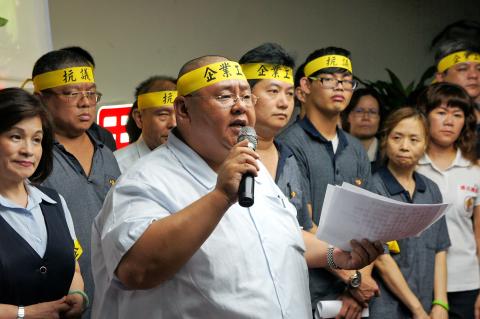Taipei Agricultural Products Marketing Co yesterday elected three standing directors at a board of directors meeting, but failed to elect a new president.
Taipei City Government-appointed director Lin Chiu-hui (林秋慧), Council of Agriculture-appointed director Liu Sheng-hung (劉聖鴻) and Yunlin County Farmers’ Association director-general Chien Ming-chin (簡明欽) were elected to the semi-governmental company’s board, which has the right to elect the firm’s president.
The election reportedly involves a three-way struggle between the Taipei City Government, the council and directors associated with former Yunlin commissioner Chang Jung-wei (張榮味) of the Chinese Nationalist Party (KMT), who still has influence on the company because of his connections with Yunlin farmers.

Photo: CNA
The council and the city government reportedly engineered a plan to remove company general manager Han Kuo-yu (韓國瑜), a member of the Chang faction, after the Democratic Progressive Party (DPP) administration took office in May.
The Chang faction yesterday secured five seats on the seven-member board of standing directors, with Lin and Liu the only members representing Taipei Mayor Ko Wen-je (柯文哲) and the DPP. The outcome puts the city government and the council at a major disadvantage in the firm’s presidential election and subsequent appointment of a general manager.
Responding to media queries after the meeting, Lin, a presidential hopeful reportedly favored by Ko and the council, said that Ko had sought his opinion on assuming the post.
“I am willing to do something for our farmers and Taipei residents if I am given the chance,” Lin said.
Lin praised Han’s performance when asked what her impression of Han was, saying that he has a comprehensive understanding of the company’s operations.
Lin said that if elected president, she would not nominate a new general manager to replace Han before his term ends in June next year, so that Han can continue supervising operations.
Ko blasted the company over its failure to elect a new president, accusing it of “breaking its promise” and threatening to evict the company from its business premises.
During a Taipei City Council question-and-answer session yesterday, Ko fielded tough questions about the issue.
“The city government owns the land and building housing the company. We gave them the permission to run the company, but we never said that they can reap all the benefits,” Ko said.
Ko said that if the company does not elect its new president in two days, he would be forced to “get tough.”
He said he would not renew a contract it signed with the city when it expires in December, meaning the company would have to relocate.
“In politics, credibility is very important. I will take action to deal with a breach of trust such as this,” he said.
Taipei Market Administration Office Director Sheu Shyuan-mou (許玄謀) said the newly elected directors broke up the meeting immediately after the election.
As the company’s supervisor, the administration has the right to order the company to immediately hold an extempore board of directors meeting to elect its new president, he said, adding that if the company does not comply, the agency would take action against it in accordance with the contract and the law.
Additional Reporting by CNA

POSITIVE DEVELOPMENT: Japan and the US are expected to hold in-depth discussions on Taiwan-related issues during the meeting next month, Japanese sources said The holding of a Japan-US leaders’ meeting ahead of US President Donald Trump’s visit to China is positive news for Taiwan, former Japan-Taiwan Exchange Association representative Hiroyasu Izumi said yesterday. After the Liberal Democratic Party’s landslide victory in Japan’s House of Representatives election, Japanese Prime Minister Sanae Takaichi is scheduled to visit the US next month, where she is to meet with Trump ahead of the US president’s planned visit to China from March 31 to April 2 for a meeting with Chinese President Xi Jinping (習近平). Japan and the US are expected to hold in-depth discussions on Taiwan-related issues during the

‘LIKE-MINDED PARTNER’: Tako van Popta said it would be inappropriate to delay signing the deal with Taiwan because of China, adding he would promote the issue Canadian senators have stressed Taiwan’s importance for international trade and expressed enthusiasm for ensuring the Taiwan-Canada trade cooperation framework agreement is implemented this year. Representative to Canada Harry Tseng (曾厚仁) in an interview with the Central News Agency (CNA) said he was increasingly uneasy about Ottawa’s delays in signing the agreement, especially as Ottawa has warmed toward Beijing. There are “no negotiations left. Not only [is it] initialed, we have three versions of the text ready: English, French and Mandarin,” Tseng said. “That tells you how close we are to the final signature.” Tseng said that he hoped Canadian Prime Minister Mark Carney

President William Lai (賴清德) yesterday bestowed one of Taiwan’s highest honors on Saint Vincent and the Grenadines (SVG) Ambassador Andrea Clare Bowman in recognition of her contributions to bilateral ties. “By conferring the Order of Brilliant Star with Grand Cordon on Ambassador Bowman today, I want to sincerely thank her, on behalf of the Taiwanese people, for her outstanding contribution to deepening diplomatic ties between Taiwan and SVG,” Lai said at a ceremony held at the Presidential Office in Taipei. He noted that Bowman became SVG’s first ambassador to Taiwan in 2019 and

A man walks past elementary school artworks at the Taipei Lantern Festival in Ximen District yesterday, the first day of the event. The festival is to run from 5pm to 10pm through March 15.